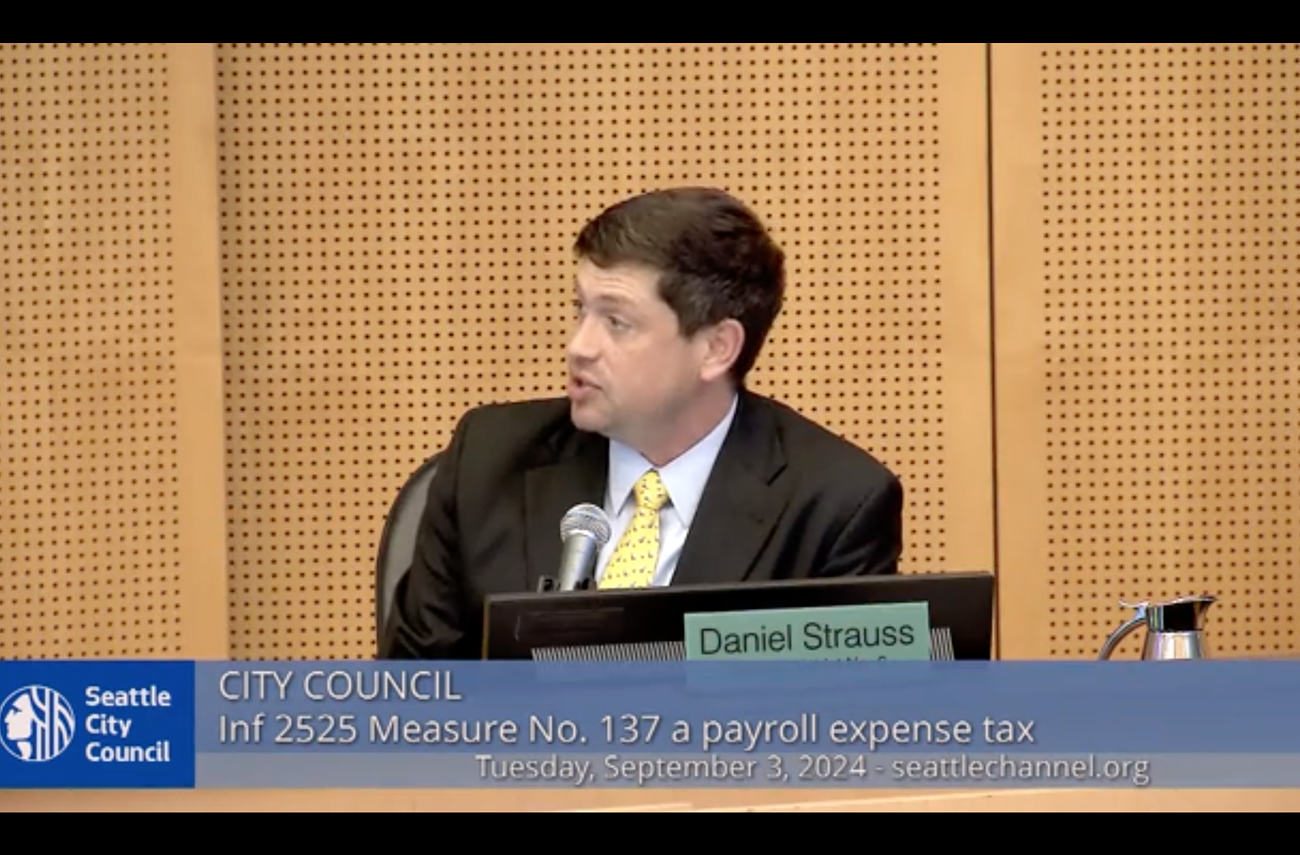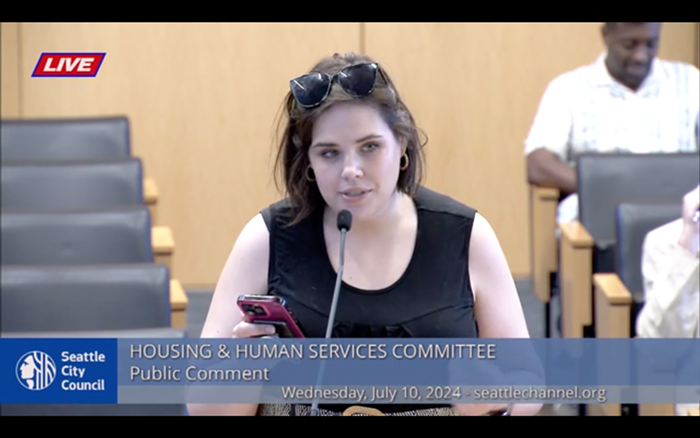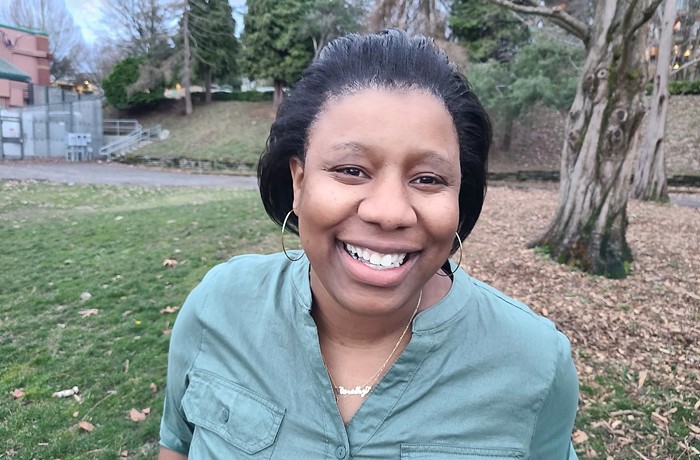The Seattle City Council only has two more meetings to put Initiative 137, which will levy a new payroll tax to pay for social housing, on the ballot. Supporters of I-137 speculated that the council delayed action last month to suppress the vote by forcing the issue to a lower-turnout election and to buy time to propose an alternate initiative. During a cagey discussion at full council this week, Council Member Dan Strauss implied an alternative to clear up the City’s legal concerns may be in the works.
At the Tuesday meeting, city council devolved into a combative back and forth: with lone progressive Council Member Tammy Morales trying to shed light on their oddly delayed vote on I-137 and her colleagues trying to shove the conversation back into the shadows. Morales, who admonished her colleagues for delaying I-137 in the first place, asked a central staff analyst to remind the council and the public what options the council has in response to initiatives. The analyst said the council can: pass the initiative outright, bypassing the election; can vote to put it on the ballot; or produce a competing measure to put on the ballot next to the citizens’ initiative.
Morales clarified—perhaps for the sake of confused members of the public, perhaps for the sake of her inexperienced colleagues—that the council cannot choose to not place I-137 on the ballot. The analyst confirmed. Eager to get the measure on the ballot, Morales asked if there were any alternatives in the works or if they should just go ahead with the procedural vote. The analyst said she could not answer that. Morales turned her question to her council colleagues.
No one outright confirmed. Strauss said he would talk to her privately or in executive session, implying he may bring forward an alternative to I-137. Morales pushed back, arguing the public deserves to know what the council is considering.
“Fair enough,” Strauss said.
CM Morales is trying to increase transparency in this oddly delayed vote on I-137 —- Is there an alternative brewing? Is the council doing the courts job? Strauss cries "attorney client privilege" and Nelson shuts her up. pic.twitter.com/fjjzRA5fsH
— Hannah Krieg (@hannahkrieg) September 3, 2024
He continued, “There was legal advice shared with us in the executive session, which I asked for more time to speak with our lawyers [about], which I am doing… If I’m going to sit up here and explain what legal opinions were shared then it would be breaching attorney client privilege.”
Morales reminded her colleagues and the public that the courts, not the council, are supposed to decide on legal issues with initiatives. Council President Nelson quickly cut her off.
In a follow up phone call with The Stranger, Strauss clarified that he is not planning to propose any of the alternatives that other groups have suggested. An “ad-hoc” group of advocates suggested an alternative that would use the funding generated by I-137’s payroll tax to fund the Office of Housing rather than the social housing developer. Council Member Cathy Moore expressed interest in such a plan, but the idea seemed to violate rules that stipulate that alternatives must be on the same topic as the original. Seattlites also received a survey, testing support for an alternative that would fund social housing developers with the housing levy rather than with a new payroll tax on businesses that pay anyone more than $1 million, making for a much more regressive system to appease big business.
Like Morales, Strauss says he is not aware of any of his council colleagues working on an alternative.
Instead, Strauss says he may produce an alternative with small tweaks to address legal concerns since the council cannot edit initiatives. Again, Strauss refused to explain the legal concerns, citing “attorney-client privilege.”
According to Cornell Law School, Attorney-client privilege “protects confidential communications between a lawyer and their client that relate to the client's seeking of legal advice or services.” It is designed to keep lawyers from being compelled to testify against their clients.
When asked if he felt he was using the term “attorney-client privilege” correctly, Strauss confirmed that in this case the City Attorney’s Office would be the “attorney” and the City Council would be the “client.” He says, “clients have the prerogative of disclosing attorney client privilege, but I’m not exercising that prerogative right now.”
If Strauss finds a way to make an alternative to address the legal concerns, it may lead to two very similar ballot measures next to each other, which could confuse voters. Strauss says that’s part of his consideration. “If it's too confusing, then just let the voters decide and the courts decide. If there's a simple fix, make the simple fix,” Strauss says.
But he’s running out of time. The council has two more council meetings before their deadline to put it on the ballot. Morales said in the Tuesday meeting she would like to vote next week on Sept. 10. Nelson agreed, saying the next meeting, Sept. 17, already looks like a full agenda.
When asked if he believes he will get his questions answered in time for a vote Sept. 10, Strauss said, “I don’t know.”
Advocates for I-137 do not extend much charity to Strauss’s unspecified legal concerns. House Our Neighbors, the group that collected signatures for I-137, wrote in a tweet, “Councilmembers continue hiding behind opaque legal concerns. Make no mistake, they are doing the bidding of their wealthy donors & multinational corporations. They will continue to protect the wealth of a few while the [majority] of Seattlites continue to be displaced and priced out.”
https://t.co/TkDEppASke pic.twitter.com/4TWIRmK0Tg
— Be:Seattle (@BeSeattleOrg) September 4, 2024




















